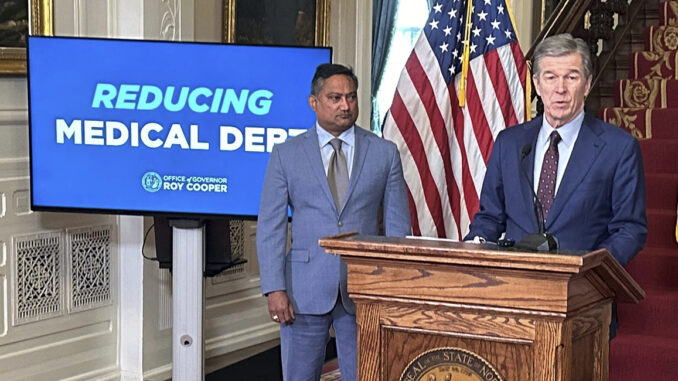
From the White House to state capitals, politicians have recognized debt forgiveness as a powerful tool for swaying voters and rewarding preferred constituencies.
At the same time, federal regulators are working to remove medical debt from credit scores. Recently, Vice President Kamala Harris’s office commended North Carolina for its forgiveness of $4 billion in medical debt.
Anyone who is struggling with medical debt and sees that debt obligation removed would be relieved. But targeting medical debt without addressing the dynamics that created it is a recipe for disaster. If policymakers really want to restrain its growth, they should start by allowing for greater competition within the health care system to lower costs.
It’s clear Americans are increasingly struggling to cope with rising health care costs. A 2022 survey by the Kaiser Family Foundation found that “41 percent of adults currently have some debt caused by medical or dental bills.” The Consumer Financial Protection Bureau estimates Americans carried $88 billion or more in medical debt in 2021.
The hard reality is that despite politicians repeated promises to reduce health care costs, they continue to spiral upward. This is because government intervention often leads to increases, regardless of the intentions of the intervention. Forgiving debt without addressing the drivers of the rising costs treats the symptom, not the disease.
Increasing competition has proven to curb growing health care costs. Yet many states continue to artificially constrain the supply of health care through restrictive laws and regulations that crowd out competition.
Chief among these is the certificate of need (CON) which requires hospitals and health care providers to seek permission from state regulators before opening or expanding a facility, offering new services, or purchasing new technology or equipment. Ostensibly the laws are intended to ensure an “adequate supply” of health care services, but they only make health care less accessible and more expensive for both providers and patients. In many cases, state regulators allow existing market providers to approve or disapprove new applicants, making the CON process a “competitor’s veto” that distorts the marketplace in favor of incumbent providers.
Not every state burdens health care providers with CON laws. Forty percent of the nation lives in a state with only one or zero CON laws, making it easy to compare what happens when states like North Carolina restrict access to necessary health care facilities and services.
A recent study by health policy expert Matthew D. Mitchell details how CON laws end up limiting access, degrading quality and increasing costs for health care services.
“Given the anticompetitive features of the regulation, it may also give providers some degree of pricing power, insulate them from the incentive to contain costs, and encourage wasteful efforts to seek and maintaining the privilege,” Mitchell writes. “All these features suggest that CON is more likely to increase than decrease health care spending per service. And, in fact, that is just what the evidence shows.”
The study surveyed decades of academic literature, which overwhelmingly shows that CON laws lead to fewer health care providers, higher expenditures and reduced access to critical medical services. Mitchell concludes that repealing CON laws to unleash competition would benefit patients by allowing the market to provide more plentiful, and less costly, services.
Despite the evidence, legislatures are slow to repeal CON laws. To its credit, the General Assembly made a few reforms as part of the 2023 Medicaid expansion bill, but there’s more to do. North Carolina could have followed South Carolina’s lead. It scrapped the whole CON program for everything except nursing homes in 2023. Montana did the same in 2021 and this year, Oklahoma also repealed CON for everything except nursing homes.
Instead of enacting laws that will encourage competitive pricing, Gov. Roy Cooper’s decision to forgive $4 billion of medical debt won’t prevent people falling back into it. Future patients will continue incurring large levels of medical debt, creating pressure for further rounds of forgiveness. If Cooper truly wants to address health care costs and relieve pressure on consumers, he should work with the legislature to continue repealing the CON laws and unleashing greater competition.
Governance should be about solving problems, not promoting feel-good measures while problems fester. Wiping out health care debt in one go won’t tackle the underlying issue of why people are accumulating so much medical debt to begin with.
If policymakers want to help patients, they should focus on eliminating anticompetitive regulations like CON laws that are driving the explosive rise in health care costs.
Jaimie Cavanaugh is legal policy counsel at Pacific Legal Foundation, a public interest law firm that defends Americans’ liberty against government overreach and abuse.



